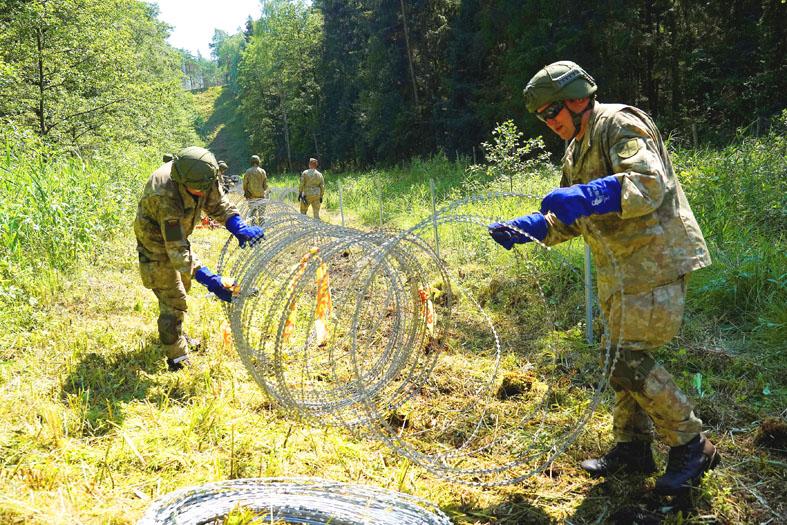Lithuania on Friday announced that it would build a border wall with Belarus to stem the flow of migrants from Africa and the Middle East arriving from the ex-Soviet country.
So far this year, Lithuanian border guards have detained more than 1,500 migrants arriving from Belarus, compared with 81 for all of last year.
On Friday, the military of the Baltic country, a EU and NATO member, started to put up a barbed wire on the border to deter asylum seekers, most of whom are from the Middle East and Africa.

Photo: Reuters
“The first stage is a barbed wire fence. In the second stage, we will go ahead with the construction of a physical fence,” Lithuanian Minister of the Interior Agne Bilotaite said, laying out plans for a 550km border wall.
Tensions between Minsk and Vilnius soared last year after Lithuania became a hub for the Belarusian opposition, following a disputed presidential election.
Belarusian opposition leader Svetlana Tikhanovskaya fled to Lithuania after claiming to have defeated Belarusian President Aleksander Lukashenko in the ballot on Aug. 9 last year, which critics say was rigged in his favor.
The Lithuanian border guards on Friday said that they had detained 37 migrants over the past 24 hours.
A nation of 2.8 million, Lithuania is struggling to accommodate the unprecedented spike. It has so far failed to send any of the new arrivals back to Belarus.
The Lithuanian military is expanding tent camps set up to accommodate the migrants.
Minsk last month said that it was suspending its participation in the Eastern Partnership, an initiative to boost ties between the EU and its former Soviet Union neighbous, after Brussels imposed new sanctions over the forced landing of a European flight.
The Belarusian Ministry of Foreign Affairs at the time said that the suspension of the agreement would have a “negative impact” on fighting illegal migration and organized crime, as Belarus shares a border with EU members Poland and Lithuania.

Drug lord Jose Adolfo Macias Villamar, alias “Fito,” was Ecuador’s most-wanted fugitive before his arrest on Wednesday, more than a year after he escaped prison from where he commanded the country’s leading criminal gang. The former taxi driver turned crime boss became the prime target of law enforcement early last year after escaping from a prison in the southwestern port of Guayaquil. Ecuadoran President Daniel Noboa’s government released “wanted” posters with images of his face and offered US$1 million for information leading to his capture. In a country plagued by crime, members of Fito’s gang, Los Choneros, have responded with violence, using car

The team behind the long-awaited Vera Rubin Observatory in Chile yesterday published their first images, revealing breathtaking views of star-forming regions as well as distant galaxies. More than two decades in the making, the giant US-funded telescope sits perched at the summit of Cerro Pachon in central Chile, where dark skies and dry air provide ideal conditions for observing the cosmos. One of the debut images is a composite of 678 exposures taken over just seven hours, capturing the Trifid Nebula and the Lagoon Nebula — both several thousand light-years from Earth — glowing in vivid pinks against orange-red backdrops. The new image

CYBERCRIME, TRAFFICKING: A ‘pattern of state failures’ allowed the billion-dollar industry to flourish, including failures to investigate human rights abuses, it said Human rights group Amnesty International yesterday accused Cambodia’s government of “deliberately ignoring” abuses by cybercrime gangs that have trafficked people from across the world, including children, into slavery at brutal scam compounds. The London-based group said in a report that it had identified 53 scam centers and dozens more suspected sites across the country, including in the Southeast Asian nation’s capital, Phnom Penh. The prison-like compounds were ringed by high fences with razor wire, guarded by armed men and staffed by trafficking victims forced to defraud people across the globe, with those inside subjected to punishments including shocks from electric batons, confinement

Canada and the EU on Monday signed a defense and security pact as the transatlantic partners seek to better confront Russia, with worries over Washington’s reliability under US President Donald Trump. The deal was announced after a summit in Brussels between Canadian Prime Minister Mark Carney and European Commission President Ursula von der Leyen and European Council President Antonio Costa. “While NATO remains the cornerstone of our collective defense, this partnership will allow us to strengthen our preparedness ... to invest more and to invest smarter,” Costa told a news conference. “It opens new opportunities for companies on both sides of the